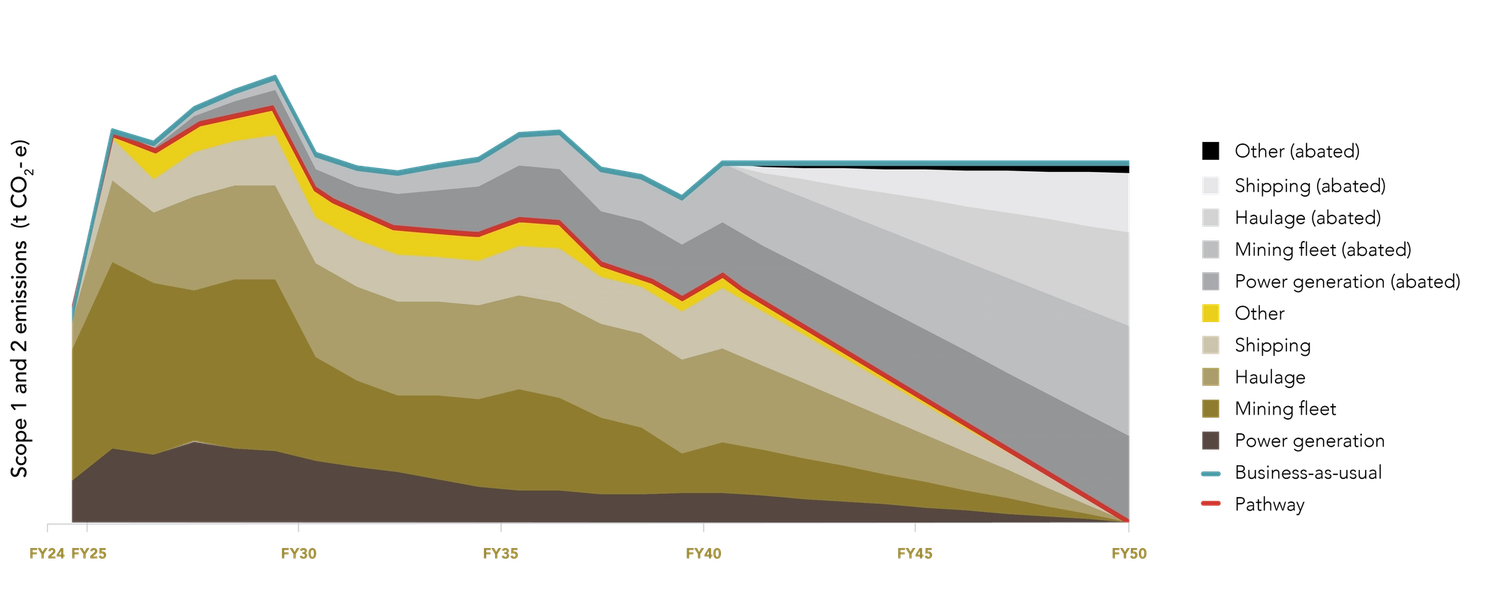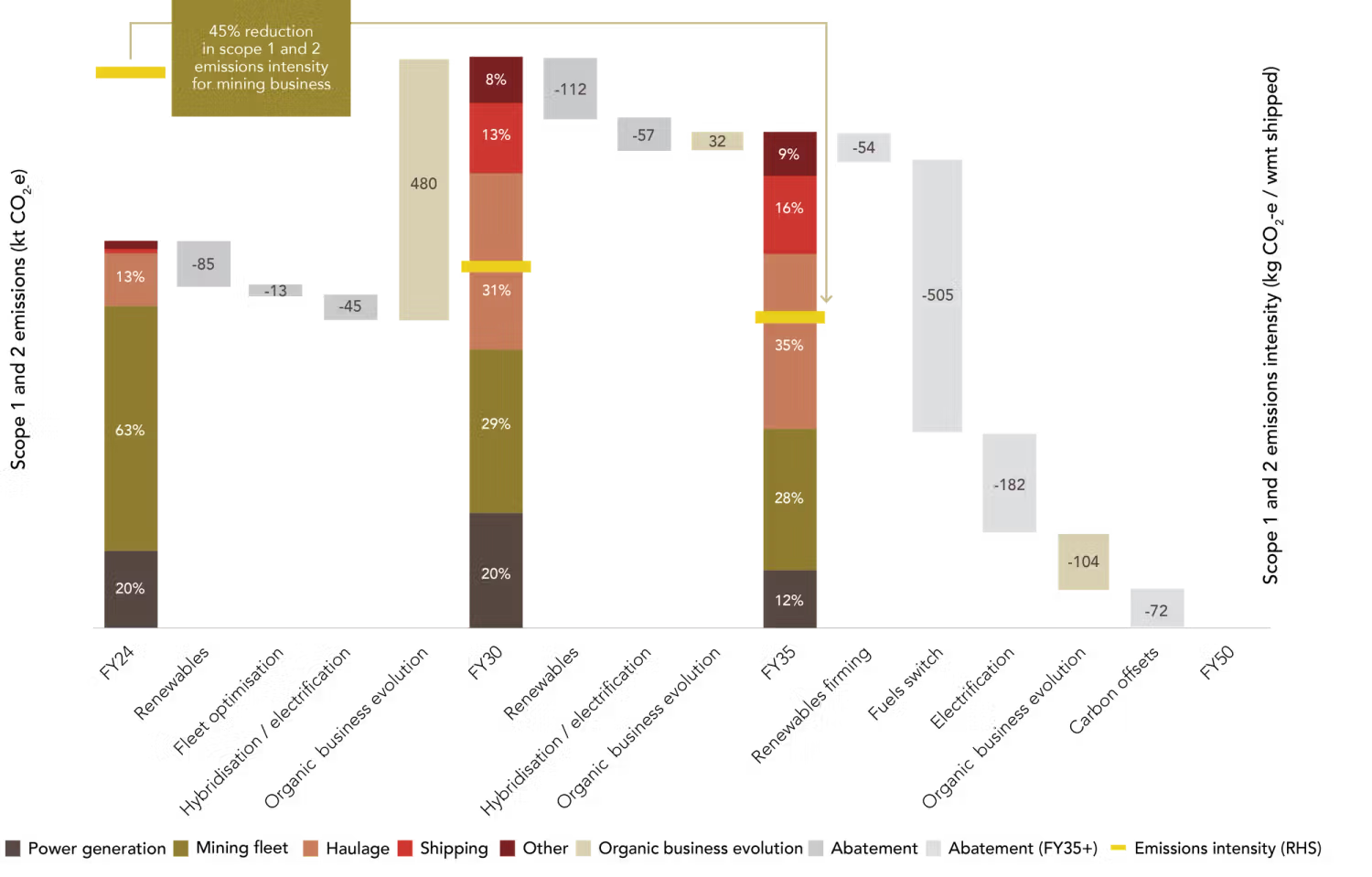Decarbonisation and climate change
We are committed to understanding and managing our climate related risks and opportunities, including reducing our emissions, supporting decarbonisation and increasing the resilience of our assets and operations.

Our management approach
We support the goals of the Paris Climate Agreement and recognise the need to achieve these goals through a just and equitable transition, which include an understanding of the effects climate change may have on our operations, our customers and the communities where we operate.
Our climate change strategies and reporting framework are guided by international principles, best practices, and regulatory compliance requirements and is underpinned by stakeholder engagement to ensure we take meaningful action to manage our impact on the natural environment.
Our FY24 disclosure primarily uses the principles of the Task Force on Climate Related Financial Disclosures (TCFD), the climate-related financial disclosures mandated through amendments to the Corporations Act 2001 (Cth) and related legislation as the core framework.
Climate Change Strategy
Climate-related opportunities and risks
We recognise the need to take action to reduce our carbon footprint. Our strategy is to adopt a practical and project-based approach to decarbonisation, using known technologies. We acknowledge we have a role to play in mitigating climate change by decarbonising our operations and supply chain. At the same time, we are also preparing to adapt to climate-related risks and capitalise on opportunities caused by a changing climate.
We have identified our climate-related opportunities and risks, with a number of identified opportunities and risks prioritised to further assess exposure using climate scenario analysis.
Refer to our 2024 Sustainability Report for further detail.
Climate scenario analysis
Climate scenario analysis (CSA) is a tool used to systematically assess material climate opportunities and risks that impact our operations and to assess the financial risks from climate change. Climate scenarios help us explore, assess and understand climate-related issues that may impact business-as-usual assumptions and form an integral part of our climate strategy. By understanding the key risks and opportunities, CSA helps us assess organisational impact and resilience, under future climate scenarios. Consequently, it will help us enhance resilience by mitigating risks and taking advantage of opportunities and quantifying the financial impact of climate change on financial projections.
The scenario analysis performed in FY24 evaluated the impact of both physical and transition risk on our assets and supply chain. The following three scenario sources were used for the assessment:
- Intergovernmental Panel on Climate Change (IPCC) scenarios
- The Network for Greening the Financial System (NGFS) scenarios
- The International Energy Agency (IEA) scenarios
Refer to the 2024 Sustainability Report for further detail.
Decarbonisation Strategy
Our Net Zero Roadmap
MinRes published its first Net Zero Roadmap (roadmap) in FY21 and subsequently set interim emissions reduction ambitions in FY22. Since then, the business has experienced significant growth and change, making the original roadmap no longer fit for purpose. During FY24, MinRes refresh its Net Zero Roadmap, including the setting of a new interim ambition and the development of Marginal Abatement Cost Curves to inform the prioritisation of our decarbonisation projects. This new roadmap is designed to take into account our ongoing growth and to more accurately capture our existing emissions profile. Only our existing operations have been considered in the roadmap (MinRes has not reached financial investment decision (FID) on the Lockyer Gas Project).
Refer to our 2024 Sustainability Report for further detail.
Long-term ambition
MinRes remains committed to achieving its long-term goal of achieving net zero by 2050.
Interim ambition
A significant element of the updated roadmap is the creation of a new interim emissions reduction ambition The interim ambition originally established in FY22 was primarily focused on existing operations, overlooking any potential future growth or expansion of the business. A new interim ambition has been created that is more closely aligned with our current and projected emissions profile. This updated ambition not only reflects our commitment to reducing emissions but also accounts for the anticipated expansion of our operations.
Our new interim emissions reduction ambition is:
- 45 % reduction in scope 1 and 2 emissions intensity by FY35 relative to an FY24 baseline (on a kg CO2 -e emitted per tonne of product shipped basis).
Roadmap to achieving our ambitions
MinRes aims to achieve its 2035 and 2050 ambitions by adopting a practical and project-based approach to decarbonisation, using known technologies that are economically feasible. Our emission reduction pathway has been segmented into three distinct time intervals to assess opportunities based on technological readiness and availability. These time horizons are short-term (FY25 to FY30), medium-term (FY31 to FY35) and long-term (FY36 to FY50).


Emissions reduction initiatives
We are committed to investigating emission reduction opportunities to support the achievement of net zero emissions by 2050. We continue to investigate ways to reduce our reliance on diesel fuel to support our emissions reduction ambitions and remain dedicated to investigating and evaluating a range of options to address hard-to-abate emissions in areas such as road haulage, mining fleet and transhipper operations.
In FY24, we commenced several emission reduction initiatives with a total spend of over $57 million (Refer to our 2024 Sustainability Report). These projects spanned multiple categories including energy efficiencies, renewable energy and electrification of fleet.
Refer to the 2024 Sustainability Report for details on our GHG emissions, carbon intensity, and identified emission reduction projects using marginal abatement cost curves to meet both our interim and long-term ambition.
Decarbonisation and climate governance
Climate change has been identified as both a material risk and an opportunity for MinRes. To ensure appropriate management, it is incorporated through our corporate governance framework and receives Board and Committee oversight.
The MinRes Board continues to oversee climate performance through the monthly tracking of greenhouse gas (GHG) emissions while delegating oversight of climate-related management including risk assessment and mitigation, opportunity identification, policy and regulatory compliance and carbon management to the following committees.
The Sustainability Committee is responsible for overseeing sustainability management, including our progress toward net zero, operational GHG data and regulatory updates. In FY25, we will look to report on climate-related metrics such as MinRes’ exposure to climate change and the financial impact of climate change on our operations, in line with the guidance from the Australian Accounting Standards Board (AASB)'s S1 and S2 Standards.
MinRes is in the process of developing an assessment framework to ensure that all members of the Committee have the appropriate skills, knowledge, experience and competencies on decarbonisation and climate change to have appropriate oversight of the risks and controls relevant to MinRes.
The Committee is deemed to have the appropriate skills, knowledge, experience and competencies to have appropriate oversight of the risks and controls relevant to us.
Where necessary, each member of the Committee may seek independent professional advice on matters relating to their responsibilities.
The Audit and Risk Committee is responsible for reviewing the organisational structure of the Company to ensure appropriate resources and processes are available and are being used to eliminate or mitigate risk.
The Committee also has oversight of our company's Enterprise Risk Register, including climate change risks, controls and mitigating actions, which is presented to the Board quarterly.
Our Chief Financial Officer, Mark Wilson, provides management-level responsibility for climate issues, and reports to the Board and Sustainability Committee on progress, authorising the monthly sustainability Board report.
Historically, decarbonisation and climate-related metrics and targets have not been linked to our Executive Leadership team’s remuneration outcomes. In line with the incoming climate-related financial disclosure legislation and AASB S1 and S2 reporting requirements, we plan to develop measurable metrics for our performance to coincide with the recommendation that these outcomes are to be linked to our executives’ remuneration structure.
Our Decarbonisation Steering Committee is an executive-level group, tasked with overseeing our decarbonisation strategy. The Committee meets quarterly to discuss ongoing decarbonisation projects aimed at reducing emissions.
The Decarbonisation Working Group meets every two months and is a cross-functional group consisting of subject matter experts from various departments within MinRes who are directly or indirectly responsible for our decarbonisation efforts.
The Working Group is responsible for matters and activities related to decarbonisation projects with the aim of reducing our GHG emissions. The Working Group progresses GHG ambitions across operations, ensuring these are aligned with MinRes’ overarching emissions reduction goals.
The MinRes Climate Change Policy acknowledges our responsibility to address the impact of our operations on the natural environment and to drive action to reduce the emissions intensity of our mining operations. The Policy outlines our commitment to managing our climate-related opportunities and risks.
We understand that addressing climate change requires a coordinated effort and ongoing collaboration with a diverse range of stakeholders. For further information on our collaboration and engagement activities with industry and stakeholders, refer to Industry Collaboration and Stakeholder Engagement.
Industry collaboration
Addressing climate change requires a coordinated effort and collaboration with a diverse range of stakeholders. To achieve this, MinRes is committed to:
- developing and maintaining strong community and stakeholder relationships with those impacted by our operations including our employees, customers, suppliers, government partners, communities and investors
- participating with industry associations to engage efforts to respond to climate change.
MinRes regularly engages with stakeholders through a range of mechanisms including our website, publications, meetings, investor roadshows, industry events and at our Annual General Meeting. As awareness of climate change continues to grow, we remain dedicated to ongoing and frequent engagement with stakeholders, fostering a deeper understanding of their concerns, interests, and potential opportunities. MinRes is involved in the following collaborations:
- Future Energy Exports Collaborative Research Centre
- Climate and Energy Reference Group
Refer to the 2024 Sustainability Report for further detail.